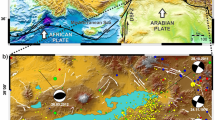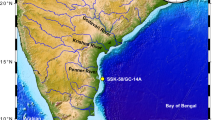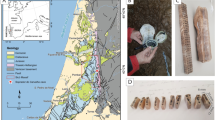Abstract
SINCE previous observations of remanent magnetism of sedimentary rocks have been mainly confined to detrital deposits, we would like to report on new significant results obtained with chemical deposits. In the case of detrital sediments, the question has arisen sporadically as to whether the inclination of the remanent vector is changed by the realignment of the magnetic particles upon meeting the bottom surface in the settling process and also by movements later in the compaction process. This question does not hold in the case of chemical deposits. Perhaps of more importance, these particular rocks exhibit a desirable stability of magnetization.
This is a preview of subscription content, access via your institution
Access options
Subscribe to this journal
Receive 51 print issues and online access
$199.00 per year
only $3.90 per issue
Buy this article
- Purchase on Springer Link
- Instant access to full article PDF
Prices may be subject to local taxes which are calculated during checkout
Similar content being viewed by others
References
Runcorn, S. K., Nature, 176, 505 (1955).
Graham, J. W., J. Geoph. Res., 54, 131 (1949).
Author information
Authors and Affiliations
Rights and permissions
About this article
Cite this article
MARTINEZ, J., HOWELL, L. Palæomagnetism of Chemical Sediments. Nature 178, 204–205 (1956). https://doi.org/10.1038/178204b0
Issue Date:
DOI: https://doi.org/10.1038/178204b0
This article is cited by
Comments
By submitting a comment you agree to abide by our Terms and Community Guidelines. If you find something abusive or that does not comply with our terms or guidelines please flag it as inappropriate.



